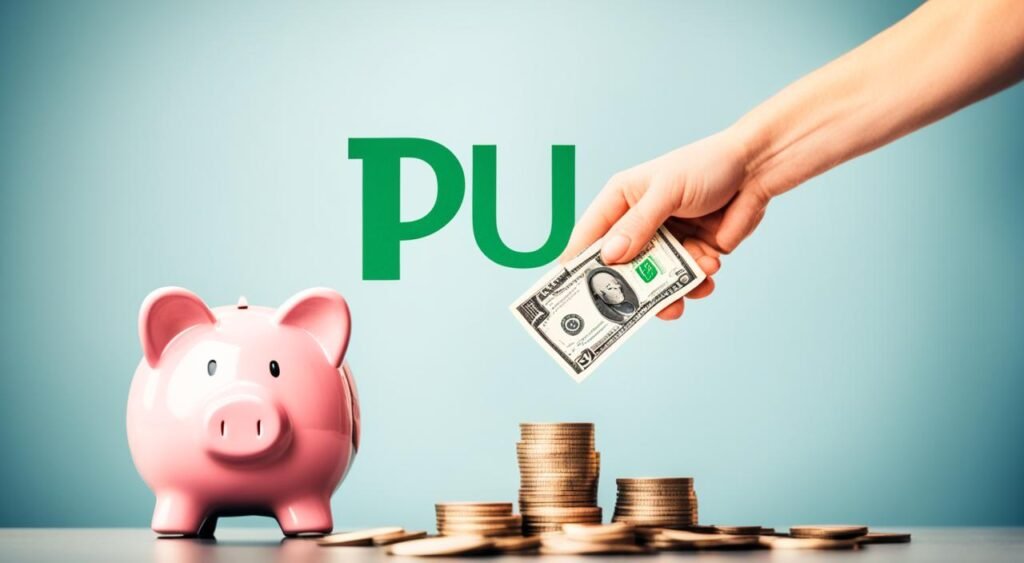Student Loan Repayment: Repaying student loans can be tough, but there are ways to make it easier. This guide offers important tips and advice to manage your student loan payments well. You’ll learn about avoiding default, ways to get forgiveness, how to pick the best repayment plan, and tips to pay them off quicker.
Key Takeaways
- Understand the consequences of defaulting on federal student loans and explore options to get out of default.
- Explore strategies for loan forgiveness and cancellation to potentially reduce your debt burden.
- Develop a budget and optimize your repayment plan to stay organized and informed.
- Consider income-driven repayment plans, such as the SAVE plan, to make your payments more manageable.
- Investigate repayment options for Parent PLUS loans, including consolidation and income-contingent repayment.
Understanding When Default Occurs
Defaulting on a student loan is a big deal. After about 270 days of no payments, a loan can go into default. This is roughly 9 months without any payment.
Consequences of Defaulting on Federal Student Loans
Defaulting on federal student loans can really hurt your future. It messes up your credit score bad. Without a good score, getting loans or credit cards is tough.
If you default, the government can take money from your paycheck or tax refunds to pay back the loan. Plus, you could lose federal benefits.
This messes up further education chances too. You won’t get federal student aid if you default. It makes paying for school again very hard.
Options to Get Out of Default
- Loan Rehabilitation: Work with your loan servicer to fix the default. You can do this by making payments on time.
- Loan Consolidation: Combining several loans into one new loan can also help. It might make repayment easier.
If you’re having trouble, don’t ignore it. Contact your loan servicer right away. They can help you figure out better ways to manage your payments.
Staying in touch and making payments helps you avoid default. There are ways to deal with student loan problems. You just need to take the first step.
Strategies for Loan Forgiveness and Cancellation

Managing student loan debt can be tough, especially when you’re not sure what options you have. But, there are many programs that can help clear part or all of your debt.
The Public Service Loan Forgiveness (PSLF) program is one such option. It aims to support those working in public service. It forgives the remaining balance on your federal student loans after you make 120 payments and work full-time for a qualified public service sector.
The Teacher Loan Forgiveness Program is another good option. It offers up to $17,500 in forgiveness for teachers who have worked for 5 years in a low-income school or educational agency. For teachers wanting to lower their debt, this is a great program.
Those on income-driven repayment plans have a chance too. After making payments for 20 or 25 years, depending on the plan, they could see their remaining balance forgiven.
To utilize these strategies, it’s key to research each program’s requirements. Knowing your options and being proactive can help relieve your student loan burden.
| Forgiveness Program | Eligibility | Potential Forgiveness Amount |
|---|---|---|
| Public Service Loan Forgiveness (PSLF) | Full-time employment in a qualifying public service organization and 120 qualifying monthly payments | Remaining balance of eligible federal student loans |
| Teacher Loan Forgiveness Program | Highly qualified teachers with at least five consecutive years of service in a low-income school or educational service agency | Up to $17,500 |
| Income-Driven Repayment Plan Forgiveness | Consistent payments under an income-driven repayment plan for 20 or 25 years, depending on the plan | Remaining balance of eligible federal student loans |
Exploring student loan forgiveness and cancellation can lead to debt reduction. By learning about these options, borrowers may find ways to clear their student loan debt.
Take Control of Your student loan repayment
Handling student loan repayment may look hard, but there are ways to manage it well. By using smart budgeting, taking care of your loans, and staying organized, you can get on top of your finances. This sets you up for success in the future.
Budgeting and Managing Your Loans
Begin by making a detailed budget for your student loans. Know the total you owe, interest rates, and monthly payments for each loan. This info helps manage your payments better.
- Make a list of your student loans with details like the lender, amount, rate, and monthly pay.
- Sort your loans by type, like federal or private, and the interest rates.
- Create a budget that includes funds for your loans, preventing late payments and extra fees.
Optimizing Your Repayment Plan
Once you understand your loan situation, look for ways to improve how you pay them back. You could combine loans, choose income-based plans, or talk to lenders for better terms.
- Look at different repayment plans and pick one that fits your budget.
- Think about merging your federal loans to make payments easier and lower rates.
- See if you qualify for loan forgiveness, like for public service work or teaching.
Staying Organized and Informed
Keeping your loans organized is key. This means tracking documents, contacting your loan servicers, and staying updated on any changes.
- Have a system, digital or physical, to save loan documents and agreements.
- Regularly check your loan status to catch any changes or updates.
- Always keep in touch with your loan servicers to solve any issues quickly.
Manage your student loans actively by budgeting, improving your payback plan, and staying organized. This will empower you to take charge of your financial future, aiming for a life free from debt.
Pursuing Income-Driven Repayment Plans

Do you find your federal student loan payments hard to handle? Then, consider income-driven repayment (IDR) plans. These plans check your income and family size to set your payment. This could lower it to $0 per month. The SAVE plan is a good option. It offers low payments and quick loan forgiveness for small balances.
Enrolling in the SAVE Plan
If you’re eyeing the lowest IDR payments, check out the SAVE plan. It looks at your income and family info to decide your payment. For people with small loan amounts, it might lead to quicker loan forgiveness.
Automating IDR Recertification
Renewing IDR plans yearly is key. You must update income and family details. This ensures your payments stay low. Setting up auto-recertification with your loan servicer is wise. It prevents payment hikes and keeps your plan working right.
| Repayment Plan | Monthly Payment | Loan Forgiveness |
|---|---|---|
| SAVE | As low as $0 | Generally faster than other IDR plans |
| Income-Based Repayment (IBR) | 10% of discretionary income | After 20-25 years of payments |
| Income-Contingent Repayment (ICR) | 20% of discretionary income | After 25 years of payments |
Looking into IDR plans like SAVE and setting up auto-recertification puts you in charge of your student loan. It’s a step towards financial security.
Repayment Options for Parent PLUS Loans

Figuring out how to pay back Parent PLUS loans can be tricky. But knowing your options can make your debt more manageable. A good step is to think about combining your loans. This could let you use different plans that base your payments on what you earn.
Consolidating Parent PLUS Loans
Parent PLUS loans don’t work with many repayment plans like IBR or PAYE. Yet, you can merge them into a Direct Consolidation Loan. Then, you might qualify for the ICR plan. This change might lower what you pay each month.
Consolidating with other loans could mean losing certain perks. So, think hard before you combine them.
Applying for Income-Contingent Repayment
The ICR plan is made just for Parent PLUS loans and bases what you pay on your income and family size. This is meant to make payment easier. To sign up, you need to combine your loans into one.
If you find yourself struggling to pay each month, the ICR plan could be a big help. It makes your payment amount fit your income better. This could stop you from missing payments or running into other problems.
| Repayment Option | Eligibility | Potential Benefits |
|---|---|---|
| Consolidating Parent PLUS Loans | Parent PLUS loan borrowers | Allows access to Income-Contingent Repayment (ICR) plan |
| Income-Contingent Repayment (ICR) | Parent PLUS loan borrowers who have consolidated their loans | Calculates monthly payments based on income and family size, potentially lowering payments |
Rights and Benefits for Servicemembers
Servicemembers get access to special student loan benefits and rights that really help with loan payments. Knowing about these can make dealing with your student debt easier. It ensures you use all support you have.
One big plus is that servicemembers with student loans can limit the interest on loans taken before service to 6%. Thanks to the SCRA, this lowers the total interest you pay over time, saving you money.
There’s also a chance for servicemembers to get loans partly forgiven under PSLF. To qualify, one must make 120 payments while doing public service jobs, like being in the military. This can give a big break on federal student loans.
- Capping interest rates at 6% on pre-service loans through the SCRA
- Qualifying for Public Service Loan Forgiveness (PSLF) after 120 qualifying payments
- Accessing more options and protections made for servicemembers
If you’re a servicemember with student loans, knowing these rights and benefits is key. Work closely with your servicer to use every support offered. By knowing and using these, you can handle your student debt better and reach your financial aims.
“Navigating student loan repayments might seem tough, but as a servicemember, you have special protections and benefits. Take time to know your rights and check out all choices available to you.”
Preparing for Upcoming Student Loan Payments
Across the United States, borrowers are getting ready for student loan payments to restart. For those just starting or coming back after a break, it’s key to be prepared. There are important steps to take to make the transition smooth.
Updating Contact Information
The first step is to make sure your loan servicer has your correct contact details. This includes where you live, your phone number, and email. It’s crucial for getting important messages and not missing key dates.
Exploring Repayment Plan Options
After updating your contact info, look into different repayment plans. The Loan Simulator tool from the Department of Education is very helpful. It helps you see which plan works best for your budget.
If you find the typical 10-year plan too much, you can apply for an income-driven plan. This way, your payments are based on what you can afford. But, you must keep up with the recertification of your IDR plan.
Proactively doing these things will make starting loan repayment easier. Keep updated, talk to your servicer, and look into all your choices. By planning and getting ready, you can handle your loan payments wisely and well.
Strategies to Pay Off Loans Faster
Paying off student loans is tough, but using smart strategies can help you get out of debt quicker. Two main ways to do this are by making extra payments and by automating your payments.
Making Additional Payments
Want to pay off your student loans faster? Try making extra payments. Small, regular extra payments can reduce the total interest and shorten how long you owe. Here’s how to get the most out of these extra payments:
- Look for ways to add to your budget, like spending less on fun stuff or picking up a side job.
- Put any extra money towards your loan’s main balance right away. This stops it from adding more interest.
- Start with loans that have the highest interest rate. This saves you more money in the end.
Setting Up Automatic Payments
Setting your student loan payments on automatic is a great idea. It helps you stay organized and avoids late fees. Here are some good things about automatic payments:
- Your credit score gets better because your payments are always on time.
- Some lenders drop your interest rate if you set up automatic payments with them.
- It means you don’t have to worry about remembering to pay every month.
Using these methods to pay off student loans faster puts you in charge of your money and helps you reach financial freedom sooner. Remember, every bit you pay extra on your principal makes a big difference over time.
“The key to paying off student loans faster is to make a plan and stick to it. Even small, consistent extra payments can have a big impact over time.”
Maximizing Tax Benefits and Employer Assistance

Student loan borrowers can make their debt more manageable by using smart strategies. They can benefit from a tax deduction on student loan interest. Plus, some employers help out with student loan repayments.
With the student loan interest tax deduction, you can reduce your taxable income by up to $2,500. This means you pay less tax. For this deduction, you need federal or private student loans and must meet income criteria.
Some companies also give a hand with student loans. They can help by paying up to $5,250 towards your loans each year. Best part? This money doesn’t count as income for you. It’s a big win for loan holders.
To make the most of these benefits, seek advice from a tax expert. And look closely at your job’s perks to see if they offer help with student loans. Knowing your options is key.
“Leveraging tax deductions and employer assistance can make a significant difference in the overall cost of student loan repayment,” says personal finance expert, Sarah Johnson.
By using these methods, people can start to lessen their loan burden and work towards being debt-free.
Also Read: Top Career Education Loan For Students
Conclusion
Student loans are a big problem for many. But, we’ve shared a lot of important info on how to deal with them. From knowing the basics to finding ways to get rid of debt faster, we’ve got you covered. This knowledge can help you manage your student debt better.
It’s all about knowing what you can do and making a plan. When you use the tips and tools we talked about, it’s easier to pay off your loans. By being smart with your money and using available help, you can aim to be debt-free.
Repaying student loans doesn’t have to be scary. With the right moves, anyone can make it through and come out on top. Follow the advice here and you’ll be set for a better, money-wise future.
FAQs
What are the consequences of defaulting on federal student loans?
Defaulting on federal loans is serious. It can hurt your credit score. You might lose access to more loans.
Also, they could take money directly from your wages.
What options are available to get out of default on federal student loans?
If you’re in trouble, there are ways out. You can try loan rehabilitation or consolidation. Usually, it’s best to contact your loan servicer right away.
What student loan forgiveness and cancellation programs are available?
There are special programs that forgive or cancel your federal loans. Programs like PSLF and Teacher Loan Forgiveness can help. So can income-driven plans.
How can borrowers take control of their student loan repayment?
To control loan repayment, list all your loans. Know your plan options. Try automatic payments.
Keep good records and talk to your servicers. To lower debt, make extra payments. Be sure you’re in the best plan for you.
What are the benefits of income-driven repayment (IDR) plans?
These plans can cut your monthly bill or even make it $0. They base this on what you earn and your family size.
The SAVE plan is great for low balances. Also, remember to recertify each year to keep payments low.
How can borrowers with Parent PLUS loans manage their repayment?
Parent PLUS loans have fewer options. But, if you consolidate, you can get the ICR plan. This could lower monthly payments.
Be careful not to consolidate with other loans. You’d lose those loans’ benefits.
What student loan benefits and protections are available for military servicemembers?
Service members can cap their rates at 6%. They might get loan forgiveness after 120 payments in public service jobs.
How can borrowers prepare for the resumption of student loan payments?
Before payments start again, make sure your info is updated. Look at different plans with the loan simulator. Consider an income-based plan if needed.
What strategies can borrowers use to pay off their student loans faster?
To pay loans quicker, extra payments help cut the balance and interest. Automate your payments.
Refinancing for a lower rate is also smart. Use tax breaks and employer help to pay less.
How can borrowers maximize tax benefits and employer assistance for their student loans?
Use the student loan interest deduction for taxes and look into employer help. Employers can give $5,250 a year without extra taxes.
Discuss with a tax expert and HR to get all possible benefits.
. They base this on what you earn and your family size.
The SAVE plan is great for low balances. Also, remember to recertify each year to keep payments low.
How can borrowers with Parent PLUS loans manage their repayment?
Parent PLUS loans have fewer options. But, if you consolidate, you can get the ICR plan. This could lower monthly payments.
Be careful not to consolidate with other loans. You’d lose those loans’ benefits.
What student loan benefits and protections are available for military servicemembers?
Service members can cap their rates at 6%. They might get loan forgiveness after 120 payments in public service jobs.
How can borrowers prepare for the resumption of student loan payments?
Before payments start again, make sure your info is updated. Look at different plans with the loan simulator. Consider an income-based plan if needed.
What strategies can borrowers use to pay off their student loans faster?
To pay loans quicker, extra payments help cut the balance and interest. Automate your payments.
Refinancing for a lower rate is also smart. Use tax breaks and employer help to pay less.
How can borrowers maximize tax benefits and employer assistance for their student loans?
Use the student loan interest deduction for taxes and look into employer help. Employers can give ,250 a year without extra taxes.
Discuss with a tax expert and HR to get all possible benefits.





